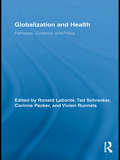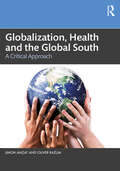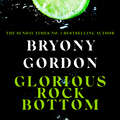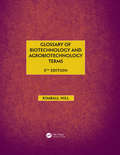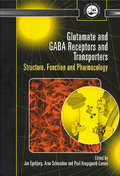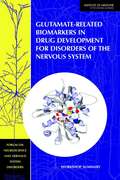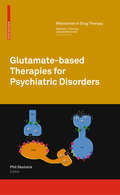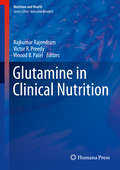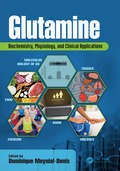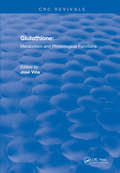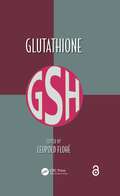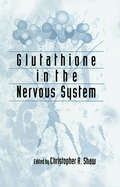- Table View
- List View
Globalization and Health: Pathways, Evidence and Policy (Routledge Studies in Health and Social Welfare)
by Ronald LabontéContemporary globalization has had tremendous impact on health equity across the globe. However, no volume has systematically analyzed the relationship between globalization and global trends in health outcomes. This book consolidates and updates the findings of a global research project undertaken by the Globalisation Knowledge Network (GKN) of the World Health Organization’s Commission on Social Determinants of Health. Chapters examine such questions as: How has trade liberalisation affected the social determinants of health? How has globalization affected food security, nutrition and equitable access to water and sanitation? How well do present global governance structures take account of the health equity effects associated with the social determinants of health? This landmark volume will be a necessary addition for researchers and scholars studying the field of globalization, health and social policy, and public health across the social sciences.
Globalization and Integration of Internationally Educated Nurses: A Comprehensive Analysis
by Ruth Lee Rola El Moubadder Ruth WojtiukThis book is a guide for stakeholders in nurse migration at a time when the shortage of nurses is a global crisis and the underutilization of Internationally Educated Nurses (IEN) a major factor. Each chapter offers perspectives on the migration processes and pathways impacting IEN integration in Canada, USA, Finland, Australia & the UK—top destination countries. Through a comparison of strengths and obstacles, we learn what works for the purpose of global replication. Issues considered include: Decision factors when choosing a destination country or a second migration Licensing processes Strategies to assist in navigating the licensure process and achieving sustained employment Actions stakeholders need to adopt to support retention and ethical recruitment Solutions and recommendations for streamlining migration and integration. This book focuses holistically on integration measures that impact IENs—families, workforce, healthcare, economies, and migration—<span lang="EN-CA" style="font-size: 12.0pt; font-family: 'Times New Roman',serif; mso-fareast-fo
Globalization and the Health of Indigenous Peoples: From Colonization to Self-Rule (Routledge Studies in Health and Social Welfare)
by Ahsan UllahIn 70 countries worldwide, there is an estimated 370 million indigenous peoples, and their rich diversity of cultures, religions, traditions, languages and histories has been significant source of our scholarships. However, the health status of this population group is far below than that of non-indigenous populations by all standards. Could the persisting reluctance to understand the influence of self-governance, globalization and social determinants of health in the lives of these people be deemed as a contributor to the poor health of indigenous peoples? Within this volume, Ullah explores the gap in health status between indigenous and non-indigenous peoples by providing a comparative assessment of socio-economic and health indicators for indigenous peoples, government policies, and the ways in which indigenous peoples have been resisting and adapting to state policies. A timely book for a growing field of study, Globalization and the Health of Indigenous Peoples is a must read for academics, policy-makers, and practitioners who are interested in indigenous studies and in understanding the role that globalization plays for the improvement of indigenous peoples’ health across the world.
Globalization, Health and the Global South: A Critical Approach
by Jimoh Amzat Oliver RazumGlobalization is a form of social change, reshaping the socio-spatial milieu in which humans strive, and in which health and disease are managed and controlled. And yet the effects of globalization are distributed unevenly, with opportunities open for some but not for all. Globalization, Health and the Global South is an important textbook for any student of this fascinating area. Examining the dynamics of globalization through the lens of the Global South, it highlights risks and vulnerabilities that affect different regions and contexts, exacerbating inequalities despite the continuing speed of global processes. The books takes a critical approach to the topic, offering readers a deep understanding of health discourses and discusses a range of key topics, including migrant health, the role of politics and diplomacy and the Coronavirus pandemic. Including further reading and end of chapter discussion questions, this essential textbook will be important reading for students across the health and social sciences.
Glorious Rock Bottom: 'A shocking story told with heart and hope. You won't be able to put it down.' Dolly Alderton
by Bryony GordonDARK, HONEST, UPLIFTING. THIS IS A SOBRIETY MEMOIR LIKE NO OTHER.'This is a book that tears down walls.' Marian Keyes'Bryony Gordon is a terrific, compassionate writer whose razor-sharp honesty slices through every sentence of this compelling memoir.' Liz Day'Poetic, raw and very important.' Fearne CottonBryony Gordon is a respected journalist, a number-one bestselling author and an award-winning mental health campaigner. She is also an alcoholic. In Glorious Rock Bottom Bryony opens up about a toxic twenty-year relationship with alcohol and drugs and explains exactly why hitting rock bottom - for her, a traumatic event and the abrupt realisation that she was putting herself in danger, time and again - saved her life. Known for her trademark honesty, Bryony re-lives the darkest and most terrifying moments of her addiction, never shying away from the fact that alcoholism robs you of your ability to focus on your family, your work, your health, your children, yourself. And then, a chink of light as the hard work begins - rehab; twelve-step meetings; endless, tedious, painful self-reflection - a rollercoaster ride through self-acceptance, friendship, love and hope, to a joy and pride in staying sober that her younger self could never have imagined.Shining a light on the deep connection between addiction and mental health issues, Glorious Rock Bottom is in turn, shocking, brutal, dark, funny, hopeful and uplifting. It is a sobriety memoir like no other.
Glorious Rock Bottom: 'A shocking story told with heart and hope. You won't be able to put it down.' Dolly Alderton
by Bryony GordonDARK, HONEST, UPLIFTING. THIS IS A SOBRIETY MEMOIR LIKE NO OTHER.'This is a book that tears down walls.' Marian Keyes'Bryony Gordon is a terrific, compassionate writer whose razor-sharp honesty slices through every sentence of this compelling memoir.' Liz Day'Poetic, raw and very important.' Fearne CottonBryony Gordon is a respected journalist, a number-one bestselling author and an award-winning mental health campaigner. She is also an alcoholic. In Glorious Rock Bottom Bryony opens up about a toxic twenty-year relationship with alcohol and drugs and explains exactly why hitting rock bottom - for her, a traumatic event and the abrupt realisation that she was putting herself in danger, time and again - saved her life. Known for her trademark honesty, Bryony re-lives the darkest and most terrifying moments of her addiction, never shying away from the fact that alcoholism robs you of your ability to focus on your family, your work, your health, your children, yourself. And then, a chink of light as the hard work begins - rehab; twelve-step meetings; endless, tedious, painful self-reflection - a rollercoaster ride through self-acceptance, friendship, love and hope, to a joy and pride in staying sober that her younger self could never have imagined.Shining a light on the deep connection between addiction and mental health issues, Glorious Rock Bottom is in turn, shocking, brutal, dark, funny, hopeful and uplifting. It is a sobriety memoir like no other.
Glorious Rock Bottom: 'A shocking story told with heart and hope. You won't be able to put it down.' Dolly Alderton
by Bryony GordonBryony Gordon is a respected journalist, a number-one bestselling author and an award-winning mental health campaigner. She is also an alcoholic. In Glorious Rock Bottom Bryony opens up about a toxic twenty-year relationship with alcohol and drugs and explains exactly why hitting rock bottom - for her, a traumatic event and the abrupt realisation that she was putting herself in danger, time and again - saved her life. Known for her trademark honesty, Bryony re-lives the darkest and most terrifying moments of her addiction, never shying away from the fact that alcoholism robs you of your ability to focus on your family, your work, your health, your children, yourself. And then, a chink of light as the hard work begins - rehab; AA meetings; endless, tedious, painful self-reflection - a rollercoaster ride through self-acceptance, friendship, love and hope, to a joy and pride in staying sober that her younger self could never have imagined.Shining a light on the deep connection between addiction and mental health issues, Glorious Rock Bottom is in turn, shocking, brutal, dark, funny, hopeful and uplifting. It is a sobriety memoir like no other.(P)2020 Headline Publishing Group Ltd
Glossary of Biotechnology & Agrobiotechnology Terms
by Kimball NillThe 5th edition of Glossary of Biotechnology and Agrobiotechnology Terms will be a significant expansion of the previous 4th edition. In the past decade, many new terms have been introduced due to the appearance and application of new crop plant breeding methods as well as technical advances in genetics, molecular biology, cell biology and agricultural research. The terms associated with important new technologies have been added to this new edition including terms related to Zinc Finger Proteins, Transcription Activator-Like Effectors (TALEs), TALE Nucleases, Genome Editing, CRISPR/Cas 9 Gene-editing Systems, Oligonucleortide-mediated Mutagenesis, and RNA Interference, as well as hundreds of others. The 5th edition, like previous editions, will be useful for regulators of agricultural biotechnology around the world, customers, biotech patent officials, venture capitalists, and agbiotech company executives, as well as biopharmaceutical industries and academics.
Glossary of Dental Implantology
by Khalid Almas Javed Steph SmithGlossary of Dental Implantology provides a comprehensive, consensus-based global platform of dental implant terminology for effective communication among dental professionals, clinicians, clinical and basic science researchers, and scientists. Offers clear definitions for dental implant-related terms for use by the whole dental team Fosters a working knowledge of currently used dental implant terminology Helps team members to communicate more efficiently and effectively Presents a comprehensive guide for specialist and general dentists, dental students, residents, dental hygienists, and dental laboratory technicians Includes entries for hardware technology, regenerative materials, lasers, radiology, and more
Glucose Revolution: The life-changing power of balancing your blood sugar
by Jessie InchauspeDietary science is on the move. For decades, people were wrongly focused on reducing fat and calories, whereas we now know that the real trouble-makers are the foods that deregulate our blood sugar levels.In writing both clear and empathetic, biochemist Jessie Inchauspé explains why blood sugar spikes are so bad for us and how to flatten those spikes to transform our health.By analysing decades of research and running thousands of original experiments on herself wearing a continuous glucose monitor, she has distilled 10 simple and surprising hacks that can be easily incorporated into everyday life.By the end of this book, you'll be aware of how food impacts your biology. You'll know which breakfast choices may be causing your cravings, in which order you should eat the food on your plate, what not to do on an empty stomach, which foods lead to mood swings, and how to avoid being sleepy at 3pm. You'll evolve the way you eat, take control of your health, and your life will flourish.
Glucose Sensor Use in Children and Adolescents: A Practical Guide
by Valentino Cherubini Daniela Elleri Stefano ZucchiniThis practical book focuses on the use of glucose sensors in children with type 1 diabetes. It is an evidence-based, simple, illustrated tool written by expert physicians in the field, experienced with patients living in Italy and in the UK.The introductory chapters offer a quick and well-documented update on technology use in the child with diabetes, while the chapter on clinical studies provides a comprehensive overview of the scientific basis and benefits on glucose sensor use. The practical use of sensors in all age groups, including toddlers, and any related psychological issues are also discussed.This volume allows health care professionals, pediatric trainees and medical students caring for children with type 1 diabetes to increase their understanding of sensor use, making this technology easier and more reliable to use.
Glucuronidation of Drugs and Other Compounds (Routledge Revivals)
by Geoffrey DuttonPublished in 1980: In a previous publication on glucuronic acid both free and conjugated, the author expressed the hope that glucuronic acid studies over the following few years might expand vigorously. The have expanded, and none more vigorously that the study of biosynthesis of simple glucuronides.
Glutamate Receptors: Methods and Protocols (Methods in Molecular Biology #1941)
by Corinna Burger Margaret Jo VelardoThis volume aims to provide clear and detailed methods to probe glutamate receptor function. Chapters in this book feature methods to study synaptic ultrastructure, receptor dynamics/receptor interactions and trafficking, cellular plasticity, receptor gene regulation, epigenetics, and clinical applications. In addition, it includes overview chapters that provide critical reviews and historical perspectives on particular techniques and fields of study. Written in the highly successful Methods in Molecular Biology series format, chapters include introductions to their respective topics, lists of the necessary materials and reagents, step-by-step, readily reproducible laboratory protocols, and tips on troubleshooting and avoiding known pitfalls.Authoritative and cutting-edge, Glutamate Receptors: Methods and Protocols covers well-established glutamate receptor techniques, as well as new and cutting-edge techniques designed so that students, researchers, and clinicians can gain an understanding of the issues surrounding each experimental technique and its potential applications.
Glutamate and ATP at the Interface of Metabolism and Signaling in the Brain
by Arne Schousboe Vladimir Parpura Alexei VerkhratskyATP acts as main energy source and is pivotal for numerous signaling cascades both inside the cells (by fuelling various transport systems and donating phosphate groups) and between the cells (by chemical transmission). Similarly glutamate acts as an important molecule for both intercellular signaling though glutamatergic transmission and cell energetics by contributing to ATP production. In this collection of chapters, written by the leading experts in the field of cell metabolism and energetics, intracellular signaling and neurotransmission we covered various aspects of the interfacing between these two fundamental molecules. This book will be particularly useful for researchers, students, physicians and psychotherapists working in the field of neurobiology, neurology and psychiatry.
Glutamate and GABA Receptors and Transporters: Structure, Function and Pharmacology (Pharmaceutical Science Series)
by Arne Schousboe Povl Krogsgaard-Larsen Jan EgebjergThe ubiquitous presence of glutamate and GABA receptors in the nervous system makes these receptor systems pivotal to our understanding of neurotransmission. Cloning of the molecular components of these receptor systems has provided insights to the selectivity of many drugs and detailed characterisation at the molecular level is emerging. Moreover,
Glutamate and Neuropsychiatric Disorders: Current and Emerging Treatments
by Zoran M. PavlovicThis volume provides a comprehensive overview of recent advances in targeting glutamate signaling for the treatment of major psychiatric and neurological disorders. It draws on the latest findings in glutamate neurobiology and offers valuable insights into the application of translational principles in neuroscience drug discovery and development. In each chapter, glutamate as a neurotransmitter, its receptors and transporters, and their interplay with other neurotransmitters and neurotrophic factors, are discussed in the context of a specific, highly prevalent and disabling CNS disease. Most recent and detailed information is provided on Ischemic Stroke, Chronic Stress, Major Depressive Disorder, Bipolar Disorder, Autism Spectrum Disorders (ASD), Posttraumatic Stress Disorder (PTSD), Alzheimer’s Dementia, Schizophrenia, Impulsive Aggression, Substance Use Disorders (SUD), Amyotrophic Lateral Sclerosis (ALS), Chronic Pain, Multiple Sclerosis, Parkinson’s Disease, Attention Deficit Hyperactivity Disorder (ADHD), Migraine, Epilepsy and Anxiety disorders. Moreover, the book includes an extensive overview of glutamatergic treatments already available on the market, and those which are currently in pharmaceutical drug development pipelines. The primary beneficiaries will be neurology and psychiatry specialists and residents, neuroscientists, neuropharmacologists, pharmaceutical industry and clinical research organization professionals, academics, and clinicians working with psychiatric and neurological patients with comorbidities such as cardiologists, pulmonologists, and endocrinologists. This book will also appeal to psychiatry and neurology subspecialists and clinicians working in neuroscience labs seeking an easy-to-understand yet comprehensive overview of contemporary evidence-based clinical insights backed by basic science (preclinical) research evidence. Given its scope, the book is also a unique and indispensable resource for both preclinical and clinical neuroscientists, medical advisors, and clinical research specialists in the pharmaceutical industry. In addition, it will appeal to neuroscience and neuropsychopharmacology students and guide them through the complexities of glutamate involvement in the pathophysiology of the most common debilitating brain diseases with high unmet medical needs.
Glutamate-Related Biomarkers in Drug Development for Disorders of the Nervous System: Workshop Summary
by The National Academy of SciencesGlutamate is the most pervasive neurotransmitter in the central nervous system (CNS). Despite this fact, no validated biological markers, or biomarkers, currently exist for measuring glutamate pathology in CNS disorders or injuries. Glutamate dysfunction has been associated with an extensive range of nervous system diseases and disorders. Problems with how the neurotransmitter glutamate functions in the brain have been linked to a wide variety of disorders, including schizophrenia, Alzheimer's, substance abuse, and traumatic brain injury. These conditions are widespread, affecting a large portion of the United States population, and remain difficult to treat. Efforts to understand, treat, and prevent glutamate-related disorders can be aided by the identification of valid biomarkers. The Institute of Medicine's Forum on Neuroscience and Nervous System Disorders held a workshop on June 21-22, 2010, to explore ways to accelerate the development, validation, and implementation of such biomarkers. Glutamate-Related Biomarkers in Drug Development for Disorders of the Nervous System: Workshop Summaryinvestigates promising current and emerging technologies, and outlines strategies to procure resources and tools to advance drug development for associated nervous system disorders. Moreover, this report highlights presentations by expert panelists, and the open panel discussions that occurred during the workshop.
Glutamate-based Therapies for Psychiatric Disorders
by Phil SkolnickBoth metabotropic and ionotropic glutamate receptors present attractive "druggable" targets in treating disorders of the central nervous system. There has been a dramatic shift in the focus of glutamate-based therapies away from neurologic disorders such as stroke and traumatic brain injury to the treatment of psychiatric disorders. This "Milestones in Drug Therapy" volume offers a unique, contemporary overview of preclinical and clinical evidence that modulating glutamatergic tone is an effective means of treating psychiatric disorders ranging from depression and anxiety to schizophrenia and drug abuse. The ability to treat diseases such as depression and schizophrenia through multiple, glutamate-based mechanisms offers a unique therapeutic opportunity, as described in this book.
Glutamine and Glutamate Mammals: Volume I
by Elling KvammeBased on the joint effort of a great many top scientists, this book covers most aspects of the metabolism and function of glutamine and glutamate in mammals.
Glutamine and Glutamate Mammals: Volume II
by Elling KvammeBased on the joint effort of a great many top scientists, this book covers most aspects of the metabolism and function of glutamine and glutamate in mammals.
Glutamine in Clinical Nutrition
by Victor R. Preedy Vinood B. Patel Rajkumar RajendramGlutamine is the most abundant amino acid and is a major contributor to whole body nitrogen metabolism and is considered to be "conditionally essential. " Glutamine in Health and Disease presents the application of current nutritional knowledge by physicians and dietitians and incorporates emerging fields of science and important discoveries. Section 1 covers glutamine structure and function, glutamine synthetase, glutamine binding protein, glutamine transport, glutamine-rich activation domains and transcription, glutamine transaminase and cell biochemistry. Section 2 covers glucose-independent glutamine metabolism, intestinal barrier function, thyroid-stimulating hormone, glutamine resonances, focal ischemia, plasma glutamine, metabolic stress, cancer and absorption. Section 3 covers dipeptide-bound glutamine, DNA protection, oxidative stress, NF-KB, the inflammatory response, the lung, kidney, GI tract and liver, autophagy, ethanol and diabetes. Finally, Section 4 covers the use of glutamine in preoperative states, enteral and parenteral nutrition, pulmonary infections, cancer, hypoxic injury, arginyl-glutamine, paediatrics, pancreatic surgery, the elderly, gastric emptying gastric bypass and use glutamine cocktails. Written by authors of international and national standing, leaders in the field and trendsetters, Glutamine in Health and Disease is essential reading for nutritionists and dietitians, public health scientists, physicians, epidemiologists, policy makers, and health care professionals of various disciplines.
Glutamine: Biochemistry, Physiology, and Clinical Applications
by Dominique Meynial-DenisGlutamine: Biochemistry, Physiology, and Clinical Applications describes the different functions of glutamine (Gln) in animals and humans. Gln is both a nutrient and a signaling molecule, and its functions go beyond those of a simple metabolic fuel or protein precursor. This book has gathered together, in an unbiased and critical manner, all the available evidence and research on Gln including pathology (neurological diseases, intestinal diseases, critical illness, and cancer), physiology (successful aging), catabolic states, immunity, and exercise. Special attention is given to the potential benefit of Gln in states of insulin resistance and the role of Gln as a "conditionally essential" amino acid. The contributors are either pioneers or experts in the area of Gln from all around the globe, including Australia, Brazil, Canada, Europe, China, and the United States. This book is a valuable source of information for nutrition scientists, medical doctors, sports scientists, food scientists, dietitians, and anyone interested in nutrition. It is also a valuable resource for students in these fields and will be an important addition to university libraries.
Glutathione (CRC Press Revivals)
by Jose VinaThe aim of this important book is to present the reader with developments concerning glutathione research. This work focuses on the synthesis-degradation and oxidation-reduction cycles of glutathione, the physiological functions of glutathione (especially in mammalian cells), and the analytical methods used to accurately measure the glutathione status of cells. This resource addresses specific modification of glutathione metabolism that is of special interest in the treatment of some tumors. This rare volume also introduces some different, new techniques on how to accurately measure glutathione, specifically in its oxidized form. Anyone involved with biochemistry, physiology, toxicology, pharmacology, nutrition and radiation biology will find this publication interesting and filled with useful information. It is also a valuable reference for research scientists in such fields as aging, metabolism disorders, and glutathione research.
Glutathione (Oxidative Stress and Disease #1)
by Leopold FlohéThis is the first serious attempt to synthesize all that became known of glutathione over the last three decades. The book contains an update of glutathione biosynthesis with special emphasis on its regulation in adaptive stress responses. Other chapters review glutathione transport systems and glutathione peroxidases and their differences in substrate specificities and localization. Further contributions center on the diversified roles of different glutathione-S-transferases and the roles of nitrosoglutathione and glutaredoxins - a subfamily of redoxins. The book closes with discussions of the analogous or homologous thiol metabolism in pathogens and the potential suitability of involved enzymes as drug targets.Key selling features: Summarizing the way glutathione is involved in stress responses Compiling the multiple ways glutathione affects inflammatory responses Disclosing how glutathione dampens programmed cell death such as ferroptosis Exploring the enigma of how enzymes accelerate glutathione-dependent processes Discussing how detoxification and redox regulation is mediated by glutathionylation Reviewing the ways glutaredoxins catalyze protein disulfide reduction Highlighting the medical impact of glutathione-related metabolic pathways Illustrating the role thiol metabolism of pathogens might play in drug discovery
Glutathione In The Nervous System
by Christopher A. ShawThe goal of this text is to focus readers attention on three major areas; the origin and localization of GSH in the nervous system; the multiple effects of GSH on neural health activity; and the potential for alterations on GSH status to lead to neurological damage of the type observed in amyotrophic lateral sclerosis, Parkinson's disease and other neurological disorders. The text also touches upon the additional roles of the antoxidant GSH, including possible neurotransmitter action, redox modulation of ionotropic receptor function, and neuroprotection against exicitoxic actions of glutamate.
